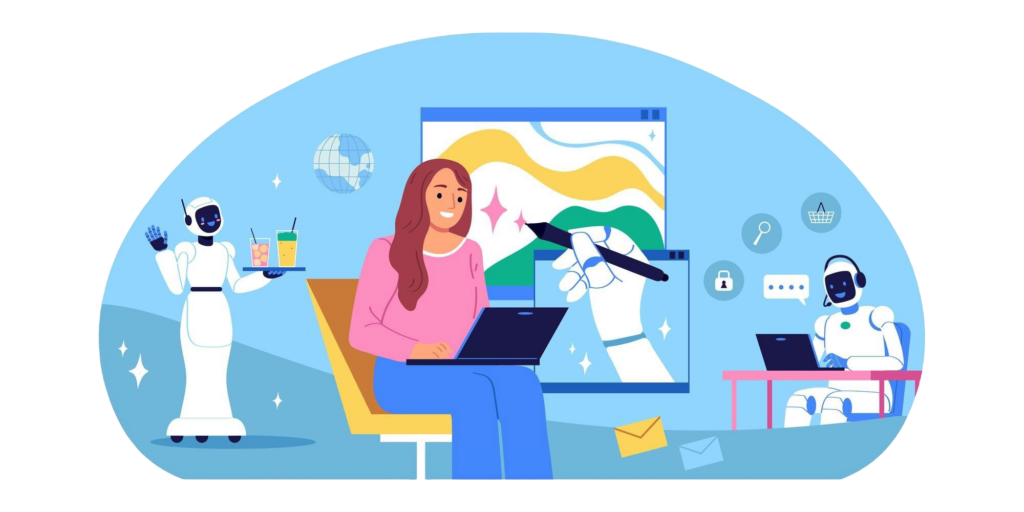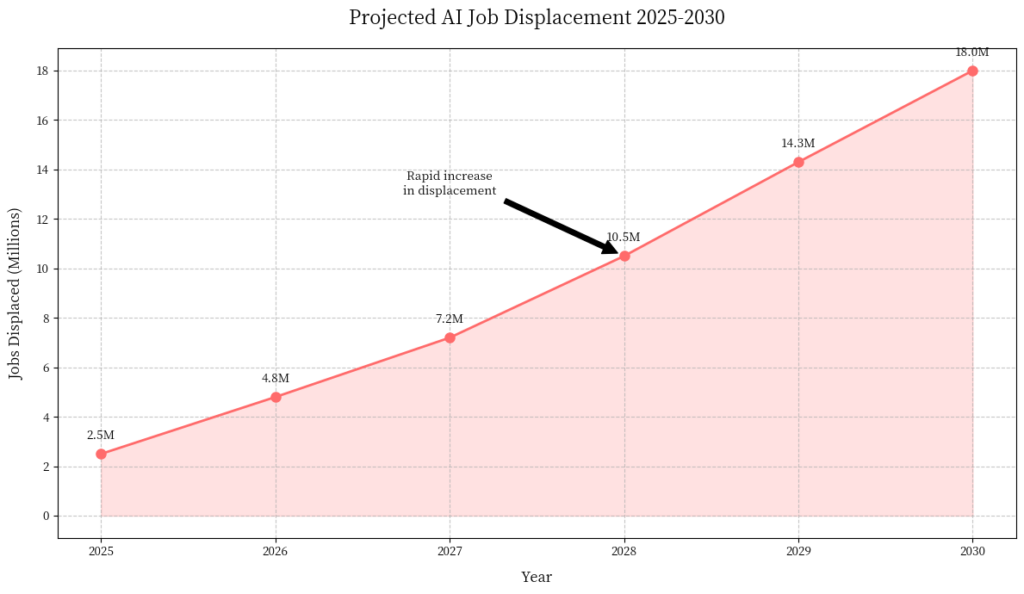How Many Jobs Will AI Replace & How to Adapt [2025 – 2030]
Table of Contents
The rapid advancement of artificial intelligence has sparked intense debate about its impact on the global workforce. As AI technologies become increasingly sophisticated, questions about job displacement have moved from theoretical discussions to pressing real-world concerns. Recent studies from leading research institutions have attempted to quantify the potential impact of AI on employment, providing crucial insights for workers and businesses planning for the future.
In this article, we will list obvious data of jobs replaced by 2024 and predict how many jobs AI is going to take over in the next several years.

How Many Jobs Have Been Replaced By AI 2024
The current landscape of AI-driven job displacement reveals significant changes across various sectors. According to recent data from Goldman Sachs, AI could automate up to 300 million full-time jobs worldwide. You can also check the detailed breakdown of the current impact.
Current Impact Statistics
- Approximately 44% of workers reported using AI tools daily as of 2024.
- The automation of routine tasks has affected 14% of the global workforce.
- Administrative and data entry positions saw a 25% reduction due to AI implementation.
Top 3 Affected Industries in 2024
1. Customer Service
As one of the most popular AI replacing jobs, chatbots, and virtual assistants have replaced 30% of traditional customer service roles. AI-powered support systems handle 70% of routine customer inquiries.
2. Manufacturing
With the robotic process automation application, 20% of assembly line workers lost their routine jobs. AI-driven quality control systems have reduced QC staff by 35%.
3. Financial Services
The third most affected financial services are automated with the latest trading systems now, handling 80% of stock market transactions. AI-powered risk assessment has reduced traditional analyst positions by 15%.
Regional Impact Analysis
| North America | 18% job displacement rate |
| Europe | 16% job displacement rate |
| Asia-Pacific | 14% job displacement rate |
| Emerging Markets | 12% job displacement rate |
Knowing the situation that jobs have been replaced by AI in the past 2024, let’s explore how many jobs AI will replace in 2025 and later years.
Projected Job Displacement (2025-2030)
Looking ahead to 2025-2030, several major studies project significant changes in the employment landscape. Here’s a detailed analysis of potential job displacement:
How Many Jobs Will AI Replace by 2025-2030?
- World Economic Forum estimates that 85 million jobs may be AI displaced by 2025.
- McKinsey Global Institute projects that 375 million jobs (14% of the global workforce) will require reskilling by 2030.

However, it is also reported that the robot revolution will create 97 million new jobs in 2025, resulting in job growth rather than decrease.
High-Risk Industries and Roles
1. Transportation and Logistics
Since autonomous vehicles are becoming a trend in transportation, AI could replace 2.5 million driving jobs in the following years. This includes taxis, metros, and buses. Warehouse automation might displace 1.8 million workers.
2. Retail
Some supermarkets or grocery stores apply self-checkout, which could eliminate 3.5 million positions. Besides, AI-powered inventory management might replace 1.2 million jobs.
3. Professional Services
The most affected jobs under professional services are legal research and accounting roles, which include:
Legal research automation: 140,000 positions at risk.
Automated accounting systems: 900,000 jobs potentially affected.
Emerging Job Categories
As the report shows above, AI brings job growth actually. While it will eliminate certain roles, some new positions will be created gradually.
- AI Systems Managers: 2.3 million new roles
AI is not working by itself but is dominated by humans. As a daily tool popular among most jobs, AI system manager plays an important role in training proper working habits with humans.
- Data Analysts and Scientists: 1.8 million positions
As we are working more frequently with technologies, data accuracy is pretty important, thus creating over 1000000 positions for data analysts and scientists.
- AI Ethics Officers: 500,000 new roles
The role of an AI Ethics Officer is multifaceted and requires a combination of technical knowledge, ethical reasoning, communication skills, and leadership abilities. As AI continues to play an increasingly significant role in various sectors, the importance of this position is likely to grow.
- Human-AI Collaboration Specialists: 1.2 million positions
Human-AI collaboration specialists ensure that organizations successfully integrate AI while maintaining human-centric approaches and maximizing the benefits of both human and artificial intelligence capabilities.
How to Adapt to AI Trending in Working
AI penetrating your daily work is unstoppable. You should learn to work with AI harmoniously to improve your skills. Check how to make yourself adaptable in the following ways.
1. Develop AI-Resistant Skills
- Learn complex decision-making, strategic planning, and creative problem-solving, making yourself an invaluable partner with AI for tasks requiring nuanced judgment and innovative thinking.
- Possess unique strengths in interpersonal communication, leadership, team management, and conflict resolution, skills that are essential for fostering collaboration, guiding groups, and navigating complex social dynamics in the workplace.
- Devote to innovation, original thinking, artistic expression, and design thinking, bringing unparalleled creativity and intuition to problem-solving and product development that AI currently cannot replicate.
2. Embrace AI as a Tool
You can develop proficiency in working with AI systems, understand their capabilities, and effectively utilize AI-powered tools to enhance professional performance and productivity.
3. Continuous Learning and Adaptation
Keep pace with regular skill updates, certifications, cross-functional knowledge acquisition, and vigilant monitoring of industry trends to adapt swiftly to evolving technological landscapes.
4. Focus on Human-Centric Skills
Last but not least, staying in modern careers hinges on cultivating robust professional networks, developing effective mentorship skills, and mastering communication abilities to foster meaningful relationships and knowledge exchange.
Bonus Tip. How to Find a Job with AI?
AI is so popular among most industries, is it possible to search for jobs using AI? Yes, it’s not just an idea anymore. Jobright allows you to finish job hunting with AI power. From building a crafted resume to matching the most suitable position, it provides an automatic choice. Besides, Jobright supports establishing network connections before applying, making it more friendly to receive interviews online.
Too busy customizing your resume to ALL of your applications?
Try the Best AI Resume Editor that suits you to every position on Jobright.ai
Find yourself with a new tailored resume that incorporates all the best practices used by professional resume coaches, all in less than 10 seconds.
Try the AI Resume Editor for FREEFAQs About How Many Jobs AI Will Replace
1. What percentage of jobs will AI replace?
According to recent studies, AI is projected to automate between 25% to 30% of existing jobs by 2030. However, this doesn’t necessarily mean permanent job losses, as new roles will emerge. The World Economic Forum estimates that while 85 million jobs may be displaced, 97 million new roles will be created due to AI and automation.
2. Will there be fewer job opportunities due to AI?
No, there won’t be fewer jobs because AI is expected to transform the job market. While certain roles will become obsolete, new positions will emerge. The key is job transformation rather than elimination. Studies suggest that 9 out of 10 jobs will be enhanced rather than replaced by AI, requiring workers to adapt and learn new skills.
3. How many jobs will AI replace by 2050?
Long-term projections suggest that by 2050, up to 50% of current job tasks could be automated. However, this doesn’t translate directly to job losses. The Oxford Economics study predicts that 20 million manufacturing jobs will be replaced globally by 2030, but estimates that the AI industry will create 97 million new jobs by 2025, with exponential growth continuing through 2050.
Conclusion
The impact of AI on employment will be significant but nuanced, with job displacement varying across industries and regions. While estimates suggest that 85 million jobs could be automated by 2030, the emergence of new roles and opportunities will help balance the employment landscape. Success in the AI era will depend on workers’ ability to adapt, acquire new skills, and embrace technological change while developing uniquely human capabilities that AI cannot replicate.
Moreover, you are recommended to try Jobright for free and enjoy. This AI copilot platform will bring you a unique experience online.

